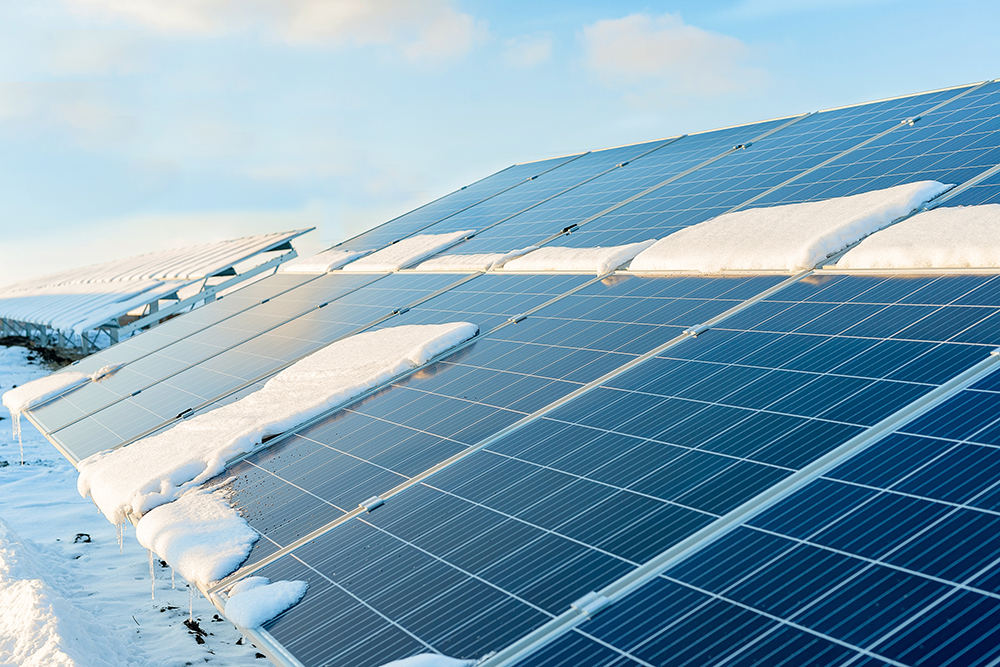
While solar energy is often associated with sunny, warm weather, commercial solar panels continue to provide substantial benefits throughout the winter months. In fact, with proper planning and maintenance, winter can be one of the best times for businesses to maximize savings with solar power. Here’s how solar energy can work harder for your business during the colder season.
Why Solar Panels Perform Well in Winter
The common misconception is that solar panels are less effective in winter due to reduced sunlight hours and colder weather. However, solar panels don’t need warm temperatures to function efficiently. In fact, cold weather can actually improve the performance of solar panels. Photovoltaic (PV) cells generate electricity more efficiently when they operate at cooler temperatures, so your panels may even produce more energy on crisp winter days than they would in the sweltering heat of summer.
While winter days are shorter and sunlight hours are reduced, solar panels can still capture plenty of sunlight, especially on clear, crisp days. The key to maximizing savings during the winter months is understanding how to make the most of these conditions.
Key Ways Solar Maximizes Winter Savings
- Enhanced Efficiency in Cold Temperatures
Solar panels are more efficient in cooler temperatures because they prevent overheating, which can sometimes occur in summer. Lower temperatures allow the photovoltaic cells to convert more sunlight into usable electricity. As a result, businesses with solar installations may see improved energy production on sunny winter days. - Snow Reflection Boosts Solar Output
Snow on the ground can actually help solar panels generate more power. When sunlight reflects off the snow, it can increase the amount of light reaching the panels, improving energy output. This effect is most beneficial when snow accumulation is light, as it reflects more sunlight onto the panels. Keep your panels clear of heavy snow accumulation to take advantage of this boost. - Offset Heating Costs
During winter, commercial buildings often face higher energy consumption due to heating needs. Solar energy can help offset these heating costs by powering electric heating systems or other energy-intensive equipment. By supplementing or replacing grid energy with solar-generated power, businesses can significantly reduce their electricity bills, especially if they have a battery storage system to store excess energy produced during daylight hours. - Maximize Daylight Hours for Energy Use
Winter days may be shorter, but businesses can optimize energy production by using solar power during peak daylight hours. Aligning high-energy activities—like running HVAC systems or equipment—during the day when solar energy is abundant can help reduce reliance on grid power. For businesses with battery storage, any excess energy can be saved for use during the evening or cloudy days.
While winter conditions may bring some challenges for solar energy generation, commercial solar panels remain a reliable and cost-effective power source year-round. By taking advantage of the increased efficiency in cooler temperatures, utilizing solar power during peak daylight hours, and clearing snow from panels, businesses can continue to benefit from solar energy in the colder months. Investing in solar panels for your commercial property provides long-term savings and supports your sustainability goals—regardless of the season.
Energy Independence This Winter: Pairing Battery Backups with Renewable Energy Solutions
As winter approaches, businesses face the dual challenge of managing increased energy demands and preparing for potential power outages due to severe weather. One of the most effective ways to ensure consistent, reliable power and reduce dependency on the grid is by pairing renewable energy solutions, like solar power, with battery backup systems. Together, these technologies offer energy independence, reduce operating costs, and provide peace of mind, especially during the colder months.
Why Battery Backups and Renewable Energy Are a Perfect Match
Winter can be unpredictable. Cold temperatures, snowstorms, and high winds often cause power disruptions, and businesses with unreliable grid access face increased operational costs when backup generators or external power sources are required. This is where combining renewable energy, like solar power, with a battery backup system makes a significant difference.
Battery backup systems store excess energy produced by renewable sources, such as solar panels, for later use. This means that even when the sun isn’t shining or during periods of high energy demand, businesses can continue to rely on stored energy to power critical systems, reducing the need for grid-supplied electricity. It’s an ideal way to ensure you won’t be left in the dark when energy needs surge during the winter months.
Contact us for a solar panel proposal to save on electric costs and produce sustainable energy for your company; contact us at salessupport@herzogelectric.com